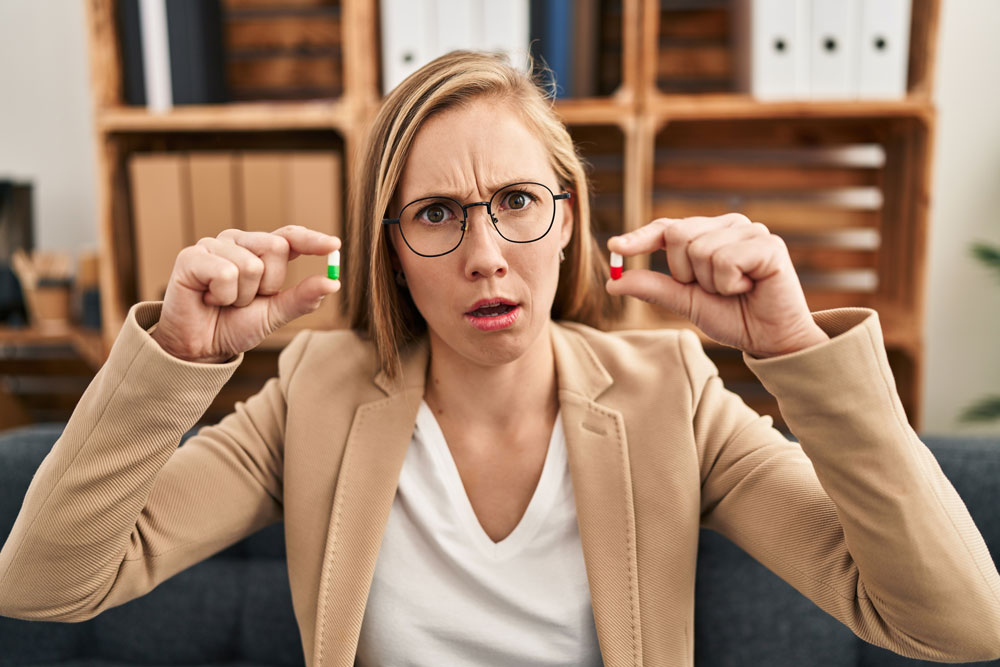
Who is confused on what supplements to take? How do you know that you’re getting what you’ve paid for? Our family nurse practitioner, Jennifer Wenning, takes a stab at explaining the complexities of supplements.
Supplements are becoming increasingly more common, and at Balance Health, we field many questions on what brands to buy and what/how/when/where/etc. I used to be of the mindset that we should be able to get all the nutrients we need from food and that supplements were only necessary if there was a proven deficiency. I trusted the guidelines set forth by the USDA and lab ranges set by various labs to guide my supplement recommendations. Fast forward several years and I now guide my patients differently and customize plans to everyone’s needs because we all have different energy requirements, stressors, sleep schedules, food preferences, toxic exposures, and so on.
“Test, Don’t Guess”
Before purchasing supplements, it’s not a bad idea to speak to your healthcare provider first. There are so many different options out there and if you haven’t had labs in a while, then it would be money well spent to see where you stand on vitamin D, iron, folate, vitamin B12, magnesium, zinc, etc., but also to make sure your liver and kidneys are in good working order and the supplements you are considering will not inadvertently interact with the medications you’re already taking. For example, I had an older gentleman that was taking warfarin (an anticoagulant) and he decided to start ginseng because he was worried about his memory after a stroke. He came in for a routine INR check (checking to see how “thin” the blood is) and he was way over range, and I was worried that one little fall could end in a fatal head injury. After some detective work, I found the drug-to-supplement interaction and after he stopped the ginseng, his INR went back to normal range.

I’m Ready To Buy, Now What?
When you finally get to the stage where you are going to purchase supplements, you now want to think about where you are going to buy them from? There have been multiple lawsuits in the last few years against counterfeit supplements being sold on Amazon and I wouldn’t be too comfortable trusting brands sold at a Dollar Store. The following are some tips to follow the next time you consider browsing the supplement section at the big box stores:
- QUALITY: You want to make sure that you are buying a good quality supplement that encompasses what the label says it contains. Look for brands that have been “3rd Party Tested” which means another company (not the manufacturer) has tested the product for purity and contents. The FDA does not regulate supplements for quality, consistency, etc. so the label may say it contains 5,000 units of vitamin D3, but in reality, it may contain 500 units or 15,000 units. That could make the difference in under-dosing or overdosing! I personally subscribe to www.consumerlab.com which allows me to look up reviews on multiple supplements (brands, ingredients, etc.) before purchasing for my family or recommending to my patients.
- PURCHASE ON MANUFACTURER SITE: If you want to ensure that you are getting the right product from the advertised company, buy the supplement directly on their website.
- GUARANTEED MONEY BACK: If a manufacturer is willing to put this on the label, then I have some confidence that I can request a refund if I’m not satisfied with the product or lack of results.
- INACTIVE INGREDIENTS: These may be added to extend shelf-life, help with moisture control, improve color or taste, keep it at a uniform consistency, etc. This is a fantastic article that I recommend reading: Inactive Ingredients / Excipients in Supplements - ConsumerLab.com.
- SUGAR CONTENT: Are you trying to lower your sugar load? Then perhaps a gummy vitamin with 5 grams of added sugar isn’t a way to a better A1C.
- AMAZON: Check to see who the seller is before purchasing. Some supplement companies do sell on Amazon so pay attention to “Sold by” but it’s not 100% guaranteed when it says “Ships from: Amazon” is actually the product that you think you will be getting.
- AUTHORIZED SELLERS: If you are going to buy from a website like Amazon, you should check to see if Amazon, Walmart, Target, etc. is an “Authorized Seller” as they are more likely to have authentic product. Some companies, like Nordic Naturals, have a NON-authorized list of companies on its website. When I put together supplement plans for patients, I either recommend our in-office supplements by Xymogen or customize a plan on Fullscript.
- PRODUCT REVIEWS: Read those customer reviews before purchasing! If people are reporting weird packaging or different capsules/colors/shapes than what they have received before, that is a big red flag!
- EXPIRATION DATES: I got caught by this one when I purchased a supplement on Amazon for my son a few years ago. Turns out it was cheaper on Amazon than the manufacturer website because it was going to expire in 1 month!
- PRESCRIPTION ONLY: If you try to buy a supplement on a manufacturer website and it requires a prescription, but then you find it available on Amazon without needing a prescription—THAT IS A HUGE RED FLAG for a counterfeit product.

Brand Recommendations
In general, these are the brands that I routinely recommend to my patients: Xymogen (sold at Balance Health), Designs for Health, Pure Encapsulations, Metagenics, Allergy Research Group, Integrative Therapeutics, Ortho Molecular Products, Apex Energetics, Standard Process, Thorne, Pendulum, Seed, Klaire Labs, Nordic Naturals, and more. These brands tend to cost more, but that is because they have to cover the cost of higher quality ingredients and paying for 3rd party testing.
Summary
Be cautious and savvy when shopping for supplements. Usually, you will get what you pay for and it’s worth the time and effort doing a little research on brands before purchasing. Come talk with us at Balance Health if you have questions and consider signing up with www.consumerlab.com if you want to find more information from a 3rd party tester. And remember, you can’t out-supplement a bad diet! What you eat still matters too!
